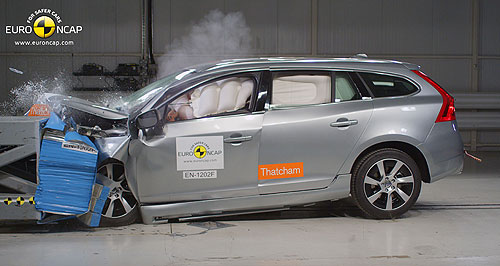Make / Model Search
News - General News - SafetyFive-star NCAP ratings for 14 new modelsSafety first: A five-star rating for the V60 Plug-in Hybrid demonstrates that the electric version of Volvo’s wagon performs as well in a crash as the conventional-engine model. European NCAP hands down top ratings for host of new models, but news not all goodGallery Click to see larger images 30 Nov 2012 By TERRY MARTIN NO FEWER than 14 new models, including vehicles significant for the Australian market, have achieved a maximum five-star safety rating in the latest round of crash testing from the authoritative independent European New Car Assessment Program. The new Mitsubishi Outlander, Ford Kuga, Opel Mokka, Hyundai Santa Fe, Subaru Forester and Land Rover’s Range Rover – SUVs which are either now on sale or coming soon to Australia – were among the five-star performers, as were the forthcoming Skoda Rapid (and related Seat Toledo), Volkswagen Golf, Mercedes-Benz A-Class, Ford Fiesta, Fiat 500L and Seat Leon. Volvo’s V60 Plug-in Hybrid also received top billing from Euro NCAP, which the safety-conscious Swedish car-maker has held aloft as testament to its philosophy that an electrified car should be as safe as any other vehicle from its stable. The plug-in hybrid, which Volvo Car Australia is attempting to secure for launch here in 2013, scored similarly to the conventional-engine V60 tested last year, despite the hybrid powertrain adding nearly 350kg. While the Chevrolet Volt and related Opel/Vauxhall Ampera, and a handful of all-electric cars and regular hybrids, have previously achieved five-star ratings, Volvo has proclaimed the electrified V60’s result is the highest-ever achieved for a plug-in hybrid. This is by virtue of the fact it scored 93 per cent for adult occupant protection, 83 per cent for child protection, 65 per cent for pedestrian protection and maximum points for its ‘safety assist’ technology. Only one vehicle tested in the latest round scored below five stars – the Renault-owned Dacia Lodgy, which managed only three and prompted Euro NCAP to state bluntly: “Whereas three stars may satisfy Dacia’s own limited ambitions, consumers are once again called upon to opt for safety, with plenty of other vehicles in this category scoring five stars this year.”“The Lodgy is a budget vehicle and customers will accept compromises in comfort and performance, but not safety,” said Euro NCAP secretary general Michiel van Ratingen. “Euro NCAP believes that occupants’ safety should be paramount, regardless of how much they pay for their vehicle.” There are no plans by Renault Australia to introduce the Dacia brand here, but the result does come at a time when the French car-maker, which previously highlighted NCAP star ratings when others actively avoided it, is taking a lower profile in championing the safety credentials of its vehicles. This could stem from the fact that some Renault passenger models might not be at the five-star level, such as the Fluence sedan which received four stars under Euro NCAP in full-electric ZE form. The Fluence ZE is soon to go on sale in Australia, joining the conventional-powered model that was launched here two years ago and which has not been rated by either Euro NCAP or its Australasian partner ANCAP. Renault’s Latitude flagship has also not been rated, while the Kangoo compact van managed only four stars when assessed last year. Among the results released this week, Euro NCAP said the new Range Rover – despite being fully redesigned – will soon be equipped with improved head restraints “to bring whiplash protection in line with expectations for a car of this quality”. It also said the seventh-generation Golf, which scored similarly to its predecessor in most areas, had set a new benchmark by including several advanced driver assistance technologies. However, the safety authority hastened to add that “despite its impressive array of advanced systems, the car misses out on a standard-fit rear seatbelt reminder, a feature which is commonplace in many cars today”. Dr van Ratingen highlighted the virtues of Ford Fiesta’s ‘MyKey’ programmable key system, which allows certain safety-critical characteristics of the car to be tailored to particular drivers. For example, parents can set limits on maximum speed and more insistent seatbelt reminders in an effort to help their children drive responsibly. “Programmable keys open up a whole new range of possibilities, not just for parents and their children,” Dr van Ratingen said. “The technology will also be of interest to companies with safe-driving policies and I look forward to more widespread application of this sort of system in the future.”  Read more20th of November 2012  Volvo turns up wick on plug-in V60Mass-production of diesel-electric Volvo V60 means big chance of local launch29th of October 2012  Jeep gets four ANCAP stars againAnother Jeep, this time the Wrangler, falls short of five-star ANCAP rating5th of October 2012  ANCAP salutes VW Up for standard auto brakingFive ANCAP stars for Opel’s Astra, GTC and Insignia plus praise for VW Up safety kit30th of August 2012  Volvo V40 awarded record crash-test scoresRecord adult occupant, pedestrian safety ratings for Volvo V40 in latest ENCAP test25th of May 2012  Four major models get top safety scoreFive-star ENCAP results for BMW 3 Series, Mazda CX-5, Hyundai i30 and Peugeot 20817th of May 2012  Mercedes-Benz B-Class tops ANCAP ratingsAlmost perfect score for Mercedes B-Class as it achieves highest ANCAP score to date2nd of April 2012  Market Insight: Five ANCAP stars now the normCars, SUVs getting safer as ANCAP influence grows, but commercials still lagging23rd of February 2012  Just two safety stars for Jeep CompassShock two-star ENCAP rating for facelifted Jeep Compass, as Honda Civic scores five |
Click to shareGeneral News articlesResearch General News Motor industry news |



















Facebook Twitter Instagram